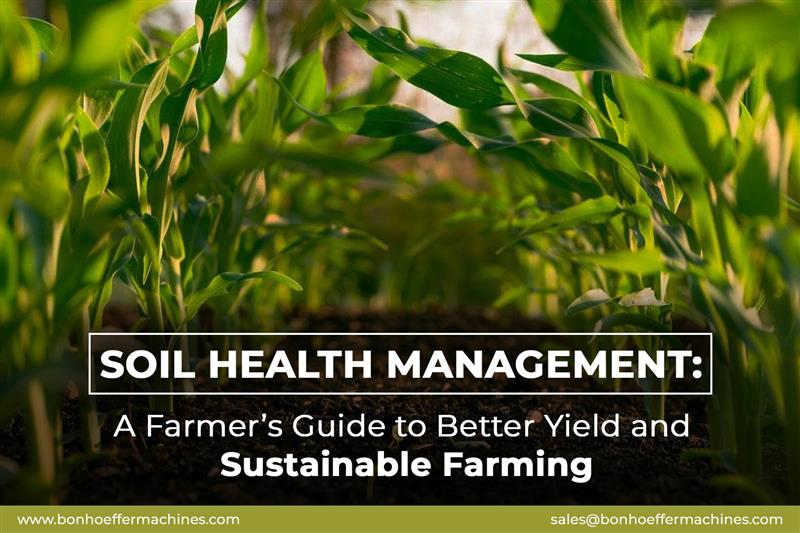
Introduction
Healthy soil is the foundation of high crop yield and sustainable farming. Yet, many Indian farmers face declining productivity due to soil degradation, overuse of chemicals, and poor water management. Maintaining soil health is crucial for long-term success in farming. But how can farmers test their soil, improve fertility, and prevent degradation?
This guide will provide practical steps to help Indian farmers enhance soil quality, boost productivity, and adopt sustainable farming practices.
Understanding Soil Health: What Makes Soil Fertile and Productive?
Soil is much more than just dirt—it is a living ecosystem that supports plant growth. Good soil health means:
Balanced Nutrients – Essential elements like nitrogen (N), phosphorus (P), and potassium (K) are available in the right amounts.
Organic Matter – Soil rich in compost and humus retains moisture and nutrients better.
Good Soil Structure – Well-aerated, loose soil allows roots to grow easily and absorb nutrients.
Healthy Microorganisms – Beneficial bacteria and fungi improve nutrient availability.
When soil health declines, crop growth suffers, requiring more fertilizers, pesticides, and water, which increases farming costs.
Soil Testing: How and Why Farmers Should Test Their Soil
Why is Soil Testing Important?
Before applying fertilizers, farmers should test their soil to understand:
- Nutrient Levels – Helps in deciding the right type and quantity of fertilizers.
- pH Balance – Determines if soil is acidic, neutral, or alkaline.
- Organic Matter Content – Assesses soil fertility.
How Can Farmers Test Their Soil?
Farmers can test soil through:
Government Soil Health Cards – The Soil Health Card (SHC) Scheme provides free soil testing every 3 years. Farmers receive a detailed report on nutrients and fertilizer recommendations.
📌 How to Apply? Visit the nearest Krishi Vigyan Kendra (KVK) or check online at soilhealth.dac.gov.in.
Local Agricultural Universities & Labs – Many states offer subsidized soil testing at research centers.
At-Home Soil Testing Kits – Available in agri-stores and online, these kits provide quick pH and nutrient level checks.
💡 Tip: Regular soil testing ensures balanced fertilizer application, reducing costs and improving yield.
Improving Soil Fertility: Natural vs. Chemical Fertilizers
To maintain soil fertility, farmers should use a balanced mix of natural and chemical fertilizers.
Natural Fertilizers (Sustainable & Cost-Effective)
- Compost – Improves soil structure and provides slow-release nutrients.
- Vermicompost – Earthworm-processed compost, rich in nutrients.
- Green Manure – Fast-growing crops (e.g., dhaincha, sun hemp) that are plowed into the soil to improve fertility.
- Cow Dung & Biofertilizers – Promote soil microbes and improve organic matter.
⚠️ Chemical Fertilizers (Use with Caution!)
- Provide quick nutrients but excessive use leads to soil degradation.
- Overuse of urea and DAP can reduce soil microorganisms and affect long-term fertility.
💡 Tip: A mix of organic and chemical fertilizers ensures sustained productivity without harming soil health.
Crop Rotation & Cover Crops: How They Improve Soil Health
Continuous farming of the same crop depletes soil nutrients, leading to poor yield. Crop rotation and cover cropping help restore balance.
Crop Rotation Benefits:
- Breaks Disease Cycles – Different crops reduce pest infestations.
- Improves Soil Structure – Deep-rooted plants (e.g., legumes) enhance aeration.
- Boosts Nutrients – Pulses and legumes naturally increase nitrogen in soil.
💡 Example:
✔ Year 1: Grow wheat (nutrient-exhausting)
✔ Year 2: Grow pulses (soil-enriching)
✔ Year 3: Grow oilseeds (deep-rooted for better aeration)
Cover Crops (Live Mulching):
Growing crops like mustard, cowpea, or rye between seasons:
Prevents soil erosion
Adds organic matter
Controls weeds naturally
Water Management for Healthy Soil
Excess water can lead to soil erosion, nutrient loss, and root rot. Proper water management ensures soil retains moisture without damage.
Techniques for Efficient Water Management:
- Drip Irrigation – Delivers water directly to roots, reducing wastage.
- Mulching – Covering soil with straw or leaves prevents moisture loss.
- Contour Farming – Plowing along natural land contours reduces erosion.
- Rainwater Harvesting – Collecting rainwater for dry periods reduces groundwater dependency.
💡 Tip: Over-irrigation leads to salinity buildup, affecting plant growth. Water only as needed.
Avoiding Soil Degradation: Common Mistakes & Solutions
- Overuse of Chemical Fertilizers → Use organic alternatives like compost and biofertilizers.
- Excessive Plowing → Practice minimum tillage to maintain soil structure.
- Burning Crop Residues → Convert them into compost or mulch instead.
- Lack of Crop Diversity → Rotate crops to maintain nutrient balance.
Farmers who avoid these mistakes can maintain soil productivity for generations.
Success Stories: Indian Farmers Who Improved Yield Through Soil Health Management
- Case Study 1: Organic Farming in Andhra Pradesh
A farmer in Anantapur district switched to vermicomposting and crop rotation, improving his soil fertility and increasing yield by 30%. - Case Study 2: Soil Health Management in Punjab
A wheat farmer in Ludhiana adopted the Soil Health Card scheme and reduced urea usage, saving ₹20,000 per season while improving crop quality. - Case Study 3: Water Management in Maharashtra
In Nashik, grape farmers used drip irrigation and mulching, cutting water usage by 40% and boosting production.
These real-life examples show that soil health management is the key to sustainable and profitable farming.
Conclusion
Healthy soil is a farmer’s greatest asset. By adopting soil testing, organic fertilizers, crop rotation, and water management techniques, farmers can increase yield, reduce costs, and sustain farming for the future.
Want to Learn More?
- Have soil health questions? Ask your doubts on our Facebook and Instagram pages, and we’ll cover them in a blog post!
- Get updates on farming techniques and machinery! Check out Bonhoeffer Machines’ YouTube channel.
- Looking for advanced farming equipment? Visit our product catalog to explore agriculture, gardening, solar, and construction machines.
Mechnova Machines Pvt. Ltd. launches its new water pump machine for farming and agriculture, designed to deliver powerful performance, efficient water flow, and long-lasting durability—supporting reliable irrigation and everyday agricultural needs.






